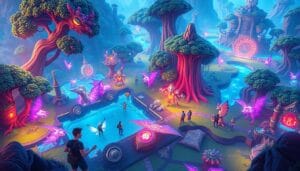Benefits of Video Games For Kids & Adults
Technology has become deeply integrated into nearly every aspect of our daily lives. Video games have grown from just fun to a tool for learning and growth. As a parent, I’ve seen how games can change my kids’ learning and happiness. Video games can bring many benefits to people of all ages.
The video game world has changed a lot. Now, 2 billion people play games worldwide, and the industry is expected to make $250 billion by 2025. The average gamer is 34 years old, showing that games appeal to everyone, not just kids.
Playing games in moderation can help with thinking, solving problems, and even mental health. Kids who play games do better in school, especially in memory, attention, and making decisions. Games can also help with thinking creatively and solving problems, skills needed today.

Table of Contents
Understanding the Evolution of Gaming in Modern Society
The video game industry has grown from simple games to a global giant. It’s expected to hit $250 billion in revenue by 2025. This shows how games have become a big part of our lives, reaching people of all ages and backgrounds.
From Pixelated Novelties to a $250 Billion Industry
Video games started in arcades and on early consoles. Now, they’re a huge and varied medium. Thanks to new tech, creative game designs, and easier access, games have become a big part of our economy.
They’re not just for fun anymore. Games are used in education, therapy, and even for professional growth.
The Changing Demographics of Gamers
The idea of a gamer has changed. Now, the average age is 34, showing a big shift. Gamers come from all kinds of backgrounds, proving games are for everyone.
Gaming’s Role in Contemporary Culture
Games are more than just fun. They’re woven into our culture. They inspire movies, TV shows, and even how we talk to each other.
The impact of games on our lives is clear. They shape how we entertain ourselves and connect with others.

“Gaming has become an integral part of our culture, blurring the lines between entertainment and everyday life.”
The video game industry keeps growing, affecting society more and more. From its huge market to the changing types of gamers, games are a big part of our culture today.
Cognitive Benefits of Gaming for Brain Development
Video games are more than just fun. Research shows they can help both kids and adults think better. They can make our brains stronger in many ways, like improving memory and decision-making.
Impact on Grey Matter Volume
Research from 2015 suggests that playing action video games can stimulate the growth of brain cells. This tissue is key for controlling muscles, sensing the world, and making decisions. More of it means better brain function and development.
Enhanced Memory Function
Gaming boosts focus and memory. These games help players develop the ability to juggle multiple tasks and retain crucial information. These skills help in school and work, making us better at solving problems.
Improved Decision-Making Abilities
Gaming sharpens decision-making skills. Gamers develop the skill to analyze situations swiftly and act decisively, even in stressful moments. These skills are useful in everyday life, helping us solve problems more effectively.

“Gaming can enhance brain capacity by fostering creative expression and cognitive growth, as indicated by studies.”
Gaming benefits all ages and types of games. Whether it’s fast-paced action or deep role-playing, gaming helps our brains grow. By embracing gaming’s cognitive benefits, we can grow personally and professionally.
Video Games Benefits for Mental Health and Stress Relief
Video games can help with mental health issues like depression and anxiety. Many adults use games as a break from daily stress. Games like Stardew Valley and strategic ones can be calming and stress-reducing.
But, too much gaming can cause sleep problems, depression, and anxiety. It’s crucial to play games in moderation. This way, they can help manage mental health issues.
Video games have been linked to better moods and mental health. Research shows that playing more than 10 hours a week is too much. Online gaming communities can also improve social skills and problem-solving.
Interestingly, video games can help with anxiety, depression, ADHD, and PTSD. Studies found that digital mental health games can reduce symptoms. They can improve focus and lower sadness.
As mental health needs grow, digital games could be a first step. They are especially helpful for ADHD and depression. This is especially true for those waiting for therapy.
“Studies indicate that short, controlled video game sessions (20-45 minutes, three times a week) yield positive cognitive outcomes, offering a contrast to fears about excessive gaming and screen time.”
Video games can’t replace professional mental health care. But, they can be a useful tool for stress management. Video games, when used in moderation, can be a healthy part of an overall well-rounded lifestyle.
Educational Value and Learning Enhancement Through Gaming
Video games are more than just fun. They are powerful tools for learning. They help students improve in many subjects, offering skills that school alone can’t provide.
Academic Skill Development
Games like chess and Minecraft boost problem-solving and thinking skills. They teach players to make quick, smart decisions. These games also spark creativity and help with fast thinking, skills needed in today’s world.
Subject-Specific Learning Games
There are games for every subject, from math to social studies. They transform learning into an engaging experience, making it easier for students to retain and apply knowledge. In fact, games can help students remember up to 90% of what they learn, compared to 10% in class.
Coding and Technical Skills
Games can also teach coding and tech skills. Players can create and modify games, learning coding and computer science. These skills are crucial for jobs in tech, a field that’s growing fast.
Games offer a unique way to learn. They give feedback right away and let players learn at their own pace. This makes them great for improving education and making learning fun for everyone.
Social Skills and Community Building in Gaming
Video games have grown beyond just fun. They offer a place for socializing, building communities, and learning life skills. Whether it’s playing online or gathering for board games, gaming creates a sense of togetherness that goes beyond the screen.
Games like Fortnite, Overwatch, and League of Legends teach teamwork and communication. Skills Gained from Gaming That Benefit Both Education and Career. Players learn to work together, think strategically, and communicate well.
Online gaming communities and forums are hubs for players to connect. They offer support and friendship for those who find it hard to meet people in person. These groups share experiences, challenges, and victories, creating strong bonds and a sense of community.
Board games like Monopoly, Scrabble, and Ticket to Ride bring families together. They promote learning, bonding, and social interaction. The rise of multiplayer games has made it easier for families to play together online.
Gaming also boosts creativity, self-expression, and emotional intelligence. Games like Life is Strange, The Last of Us, and Undertale help players understand complex emotions and characters. This builds empathy and emotional awareness.
It’s true that too much gaming can be a problem. But the social and community aspects of gaming are important. By playing in a balanced way, people can improve their social skills, make friends, and be part of active gaming communities.
Physical Benefits and Motor Skill Development
Video games are more than just fun. They Can Improve Physical Skills Like Coordination and Dexterity by requiring precise movements and quick decision-making. The fast actions in games help improve hand control and wrist movements.
Hand-Eye Coordination Enhancement
Video games that demand swift responses and fine motor control can help sharpen hand-eye coordination and enhance physical reflexes. Research shows gamers often beat non-gamers in tasks needing fine motor skills, like flying drones or doing surgery.
Therapeutic Applications
Medical experts are now using video games in physical therapy. For instance, stroke patients can improve wrist and hand control by playing games that test their motor skills. This method is more fun and effective than old-school physical therapy.
Dexterity Improvement
Playing video games often requires precise, repetitive movements. Over time, gamers show better finger and hand coordination. This skill can help in tasks needing fine motor skills.
“Video games have the potential to be a powerful tool for physical rehabilitation and motor skill development, provided they are designed with that purpose in mind.”
Using video games in physical therapy and promoting healthy gaming can improve motor skills, hand-eye coordination, and physical therapy results. It’s a way to make digital entertainment work for physical benefits.
Gaming as a Tool for Professional Development
In today’s fast-changing job market, employers want people with a wide range of job skills. They look for those who can handle new challenges. Video games can help develop these skills, making them useful in the workplace.
Managing teams is a key skill in business. Games like World of Warcraft teach players to work with others, make important decisions, and lead. These skills learned in games can be used in real-life management jobs.
Playing video games also improves problem-solving, strategic thinking, and quick decision-making. These are skills that employers value a lot. The multitasking and flexibility gained from gaming can make you more efficient at work.
| Skill | How Gaming Develops It | Workplace Application |
|---|---|---|
| Leadership | Coordinating team efforts, making critical decisions, leading virtual teams to success | Managing teams, delegating tasks, making informed decisions |
| Problem-Solving | Analyzing complex situations, devising creative solutions, and adapting to new challenges | Tackling workplace problems, generating innovative ideas, and responding effectively to change |
| Spatial Awareness | Navigating 3D environments, understanding spatial relationships, and improving hand-eye coordination | Performing tasks that require spatial reasoning, such as drone operation and surgical procedures |
Gaming is more than just fun; it’s a way to develop skills for your career. It helps you prepare for the challenges of today’s job market.
How Video Games Foster Family Connections
Video games have become a key way for families to bond. Games like Mario Kart and Minecraft offer a chance for families to connect and make memories together.
Intergenerational Gaming Experience
Now, games welcome players of all ages. Grandparents and kids can have fun together in games like Super Smash Bros. Ultimate and Rocket League. These games help families bond and keep seniors sharp.
Shared Learning Opportunities
Games can also teach new things. Families can learn together in educational games. This helps kids and adults grow and strengthens their bond.
Studies show that playing games together boosts feelings of togetherness and learning. It helps families make lasting memories and grow closer.
“Video games have rapidly evolved and are now a common bonding avenue for people of all ages, including grandparents and grandchildren.”
Video games play a big role in family bonding. They help families connect across generations and learn together. This strengthens relationships and creates memories that last a lifetime.
Responsible Gaming and Screen Time Management
Video games can be great for our minds and social skills. But, it’s important to use them wisely. Finding a good balance between gaming and other activities is key.
For kids and teens, the American Academy of Pediatrics suggests limits. They say under 30 to 60 minutes on school days and 2 hours or less on non-school days. For kids under 6, it’s best to keep screen time under 1 hour a day.
Parents have a big role in teaching kids to game responsibly. Two-thirds of US children and adolescents say their parents have no rules for media use. Setting clear rules can help keep gaming in check and support a balanced life.
Most gaming devices come with tools for parents to control their kids’ gaming. These tools let parents set age limits, control spending, and limit playtime. Adding non-screen activities and gaming-free days can also help keep things balanced.
Gaming can be good for stress relief and mental stimulation. But, it’s important to watch screen time to avoid problems like sleep issues or feeling lonely. By choosing educational and fun games, parents can help their kids grow and stay healthy.
“It’s important to set firm and consistent rules around gaming to avoid excessive screen time, ensuring it complements rather than dominates other aspects of life.” – Nancy M. Petry, PhD
Impact on Problem-Solving and Strategic Thinking
Video games, especially strategy and puzzle games, greatly improve your problem-solving and strategic thinking. These games offer complex challenges that need critical thinking and creative solutions. They sharpen your logical reasoning and ability to adapt.
Critical Thinking Development
Strategic games teach you to tackle problems by breaking them down and finding new solutions. The challenges presented in video games teach players to embrace failure as a learning opportunity, fostering persistence and the ability to grow through effort. These skills are very useful in school and work.
Strategic Planning Skills
Today’s games often revolve around managing limited resources, requiring players to think strategically, plan ahead, and adapt to ever-changing conditions.
These skills are essential in real life, where planning, resource management, and flexibility are key to success. Gaming can boost your performance in many areas of life.
FAQ
What are the benefits of video games for kids and adults?
Video games can boost brain power and problem-solving skills. They also improve hand-eye coordination and help with stress. Plus, they offer learning opportunities in many subjects.
How has the video game industry evolved over time?
The video game world has grown from simple games to a global hit. Today, 2 billion people play games, and the industry is set to hit $250 billion by 2025. The average gamer is now 34, showing gaming is for all ages.
How do video games impact brain development and cognitive skills?
Playing games can make your brain stronger. It boosts muscle control, memory, and decision-making. Games also sharpen focus and problem-solving skills.
What are the mental health benefits of gaming?
Games can help with depression and anxiety. They offer a break and a sense of escape. But, it’s important to play in moderation to avoid negative effects.
How do video games enhance learning and educational development?
Games are great for learning in many subjects like reading and math. They make learning fun. Some games even teach coding, preparing players for tech careers.
How do video games support social interaction and community building?
Gaming helps build communities and friendships, both online and offline. Multiplayer games improve teamwork and social skills. They’re especially helpful during times of isolation.
What are the physical benefits of playing video games?
Games can improve hand-eye coordination and dexterity. They’re used in physical therapy to help patients regain hand control. Games that require quick reflexes also boost motor skills.
How can video games benefit professional development?
Gaming teaches valuable skills like leadership and problem-solving. These skills are highly sought after in the workplace. Professions like drone operators and surgeons benefit from gaming’s spatial awareness and hand-eye coordination.
How can video games enhance family bonding?
Games are a great way to bond with family. They offer a chance for parents and grandparents to connect with younger family members. Educational games make learning fun and interactive for the whole family.
How can video games impact problem-solving and strategic thinking skills?
Strategy and puzzle games improve problem-solving and strategic thinking. They present complex challenges that require creative solutions. Players learn to plan, manage resources, and adapt to changes.







